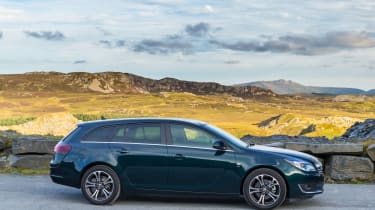Vauxhall Insignia Sports Tourer estate (2008-2017) - MPG, running costs & CO2
The Vauxhall Insignia Sports Tourer is affordable to run and insure, although it’s let down by average used values
In many ways, the Vauxhall Insignia Sports Tourer comes across as a fairly affordable car to run in the long-term. Although some versions’ CO2 emissions place them in higher road-tax bands than key rivals, the claimed fuel economy figures are quite competitive, with the diesel engines unsurprisingly being the most frugal.
Their fuel consumption also makes those diesels the ideal choice to power the Vauxhall Insignia estate, especially if you regularly drive for longer distances. However, as tempting as it is to fit automatic transmission on the handful of engines it’s offered with, this is not an option we recommend – not only is it expensive, but it also reduces the Sports Tourer’s efficiency.
By far and away the biggest bugbear with the Insignia Sports Tourer, though, is its poor values on the used market. Despite being positioned as one of the more upmarket estate cars in this class, the car suffers from fairly heavy depreciation, meaning it won’t have retained much of its new value come resale time.
Vauxhall Insignia Sports Tourer MPG and CO2
Out of all the engines in the Insignia Sports Tourer range, the 1.6-litre 'Whisper' diesel is the most efficient. Vauxhall claims it can return an impressive 72.4mpg fuel economy, while 104g/km CO2 emissions result in free road tax for the first year of ownership and a £20 annual bill after that.
More reviews
In-depth reviews
- Vauxhall Insignia hatchback review (2017-2022)
- Vauxhall Insignia Sports Tourer estate (2017-2019)
- Vauxhall Insignia Country Tourer estate (2017-2019)
- Vauxhall Insignia hatchback (2008-2017)
- Vauxhall Insignia Country Tourer (2013-2015)
- Vauxhall Insignia Sports Tourer estate (2008-2017)
- Vauxhall Insignia VXR hatchback (2009-2017)
With the other engines in the range, the Insignia estate isn’t quite the best in class. The 168bhp 'Whisper' diesel Sports Tourer’s 60.1mpg, for example, is shy of the 67mpg claimed by the 148bhp diesel in the Skoda Octavia Estate, while a big difference in CO2 emissions make the Skoda £90 a year cheaper to tax, too.
Fitted with an automatic transmission, the Insignia Sports Tourer’s efficiency plummets, most likely because only the manual cars come with fuel-saving stop-start technology, which turns off and restarts the engine automatically when you’re stopped in traffic.
Insurance group
The Vauxhall Insignia Sports Tourer range is spread over a wide range of insurance groups, starting off with the 1.4-litre petrol in entry-level Design spec (group 15) and topping out at the 2.0-litre petrol engine in high-spec SRi trim (28).
As with fuel economy, the Insignia Sports Tourer is fairly competitive for insurance costs. For example, the 161bhp diesel Sports Tourer’s group 20 rating compares quite well with the equivalent Mazda6 Tourer, which falls into group 23.
However, the Insignia’s insurance group advantage does get whittled down when the automatic transmission option is fitted, with the aforementioned diesel jumping up to insurance group 24 in that case.
Warranty
When compared with the coverage offered on its competitors, the Vauxhall Insignia Sports Tourer’s warranty is fairly standard fare. Three years and 60,000 miles is pretty much what most other manufacturers offer, so it isn’t a unique selling point.
What’s more, a handful of rivals have superior warranties – the Hyundai i40 Tourer, for instance, features a five-year/unlimited-mileage deal.
Servicing
Servicing intervals for all versions of the Insignia Sports Tourer are fairly spread out. Vauxhall states the car should have a check-up once every 20,000 miles or 12 months, depending on which comes sooner. Vauxhall servicing is also reasonably priced, so it should fit into your budget without too much difficulty. Servicing plans are also available, with the cost depending on your annual mileage, the length of the plan and which dealership you purchase the plan from.












